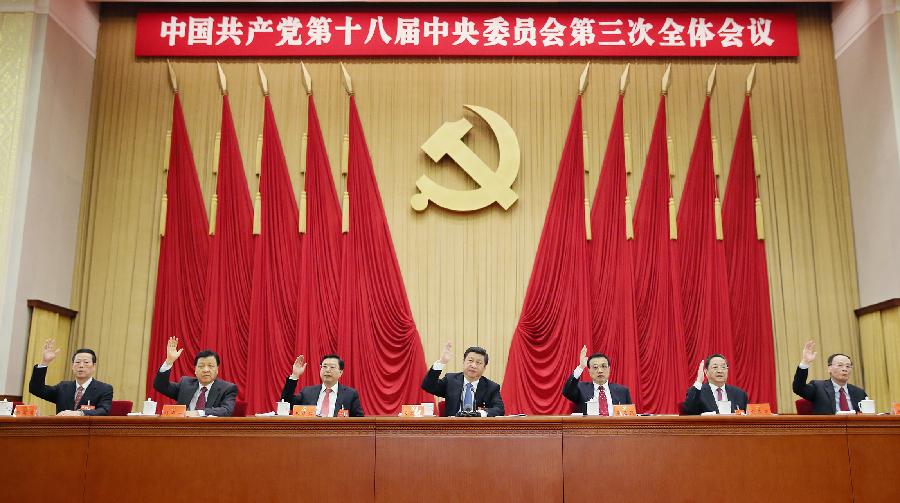 |
| Top Chinese leadersXi Jinping(C),Li Keqiang(3rd R),Zhang Dejiang(3th L),Yu Zhengsheng(2nd R),Liu Yunshan(2nd L),Wang Qishan(1st R),Zhang Gaoli(1st L) attend the third Plenary Session of the 18th CPC Central Committee in Beijing, capital of China, Nov. 12, 2013. The session lasted from Nov. 9 to 12. (Xinhua/Lan Hongguang) |
Educational resources and financial help will be provided to more needy students in China, as the country looks to promote equality in education.
The move aims to gradually narrow the rural-urban and regional gap in the education sector by using information technology, according to the Communist Party of China (CPC) Central Committee's decision on major issues concerning comprehensively deepening reforms, released on Friday.
The decision was approved at the close of the Third Plenary Session of the 18th CPC Central Committee on Tuesday.
China will balance the allocation of resources in urban and rural areas and build standardized public schools.
Educational authorities will be told to no longer classify schools as key or non-key institutions, which enjoy imbalanced resources. Key classes will no longer be allowed.
Vocational education will be further established, according to the document.
Skilled and talented workers will be better developed, and reforms in pre-school, special and further education will be promoted.
There will also be changes to the college examination system, which has been an exam Chinese educational authorities have used to evaluate students over the past 30-plus years.
According to the document, China will examine a multi-evaluation system so schools do not just enrol students based on test performance.
More autonomy will be given to school authorities in running schools.
There will be fewer examination subjects. Efforts will be made to cultivate all-round students, according to the document.
Social organizations will be entrusted to carry out education evaluations.
Currently, the quality of education is largely evaluated by educational authorities and only a few universities have the right to independently recruit.
"Reform in the education sector meets the needs of both students and the development of China's higher education," said Xiong Bingqi, deputy head of the 21st Century Education Research Institute.
"Students' overall evaluation should be listed as references in college admissions," said Chu Chaohui, a researcher with the National Institute of Education Sciences, adding that more transparency is needed during college independent recruitment.

 Bogus boyfriends for rent to please parents
Bogus boyfriends for rent to please parents Special forces take tough training sessions
Special forces take tough training sessions Britain remembers war dead
Britain remembers war dead Singles Day: In the name of love
Singles Day: In the name of love Luxury-cars parade held in Dubai
Luxury-cars parade held in Dubai China's Li River named world's 15 best rivers for travelers
China's Li River named world's 15 best rivers for travelers  China to share satellite system with Thailand
China to share satellite system with Thailand British Royal Air Force Red Arrows Aerobatic Display Team perform in Doha
British Royal Air Force Red Arrows Aerobatic Display Team perform in Doha Weekly Sports Photos
Weekly Sports Photos
Day|Week|Month